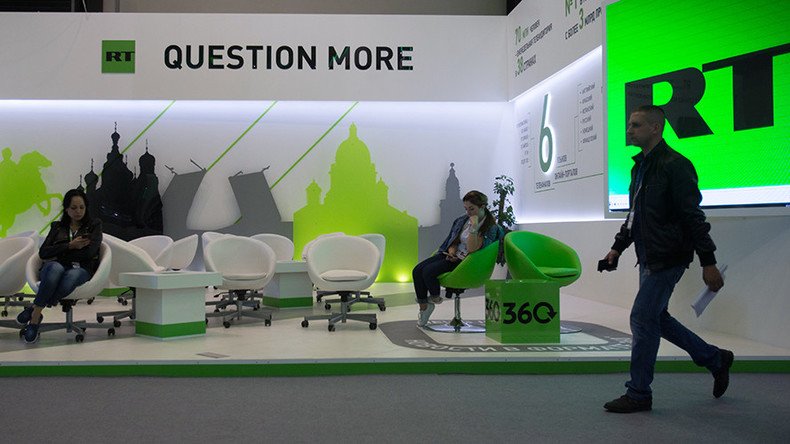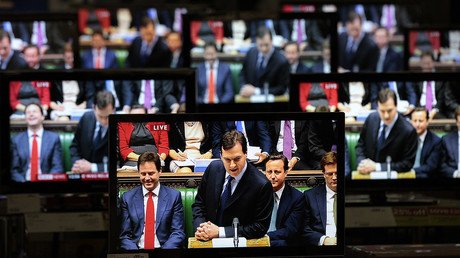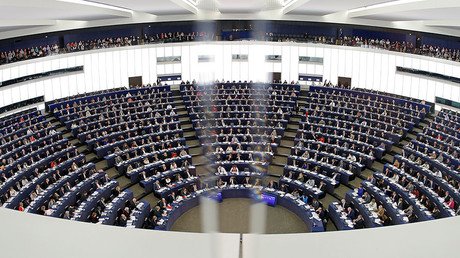RT: A gazillionaire in a world of media paupers?

The head of the US government broadcaster wants politicians, and the public, to believe how Russia spends ten times more on international media than America. The truth is that Washington devotes much more cash to this sector than Moscow.
Something which has amused me for a long time is the erroneous perception of RT’s wealth. For instance, when staffers at places like BBC, RFE/RL or Deutsche Welle assume the only motivation for engaging with this network is huge amounts of filthy lucre. As they speak, they appear to believe the RT dress code is ermine furs combined with chic Dolce & Gabbana numbers for the ladies or Brioni suits for the men. Not to mention the marble taps at Moscow headquarters and the finely dressed butlers who wait on the staff's every need. And the champagne and roses in the canteen.
When they are told how their own outlets have considerably bigger news budgets than RT, the first stage of their grief manifests as denial. I guess it later progresses to anger, and it may even extend to some sort of bargaining (notably with their own governments for more cash). But it never quite reaches acceptance. And this is why exaggerations about the financial scope of RT are reaching truly absurd levels, unchecked by reality.
Here’s John Lansing, chair of the American Broadcasting Board of Governors (which runs RFE/RL and VOA) parroting the delusion, with presumably a straight face, in an interview on National Public Radio.
Host:Is Russia investing big time in this kind of propaganda?
Lansing:Oh, their investment in media and disinformation and propaganda would dwarf that of the United States - easily ten to one.
Host:Ten to one.
Lansing:Yes. Our agency, to give you an example, is funded at $750 million a year. And we believe Russian state media would be in the range of ten times that.
Now, either they are all smoking something they shouldn't, or they are taking part in a strange sort of competition. A type of bidding war in which whoever can invent the most absurd figure regarding RT’s budget will, in turn, receive the most government funding for their own media “pet projects.”
The menace of unreality
Lansing’s figures are wild fantasies. Because he's insisting how Russian state media benefits from an annual largesse approaching $7.5 billion. Given how the entire national budget for 2017 is estimated at 16.24 trillion rubles (about $281 billion), he’s essentially suggesting the Kremlin assigns over 2.5 percent of Russia’s entire government spending to national media.
This is a claim with no foundation in reality.
Regarding government-funded foreign media outlets, Russian has two—Sputnik and RT—which together in 2016 received 17 billion rubles and 6.1 billion rubles respectively (About $401 million in total at today's rates). Indeed, the entire sum the Russian government spends on media, domestic and foreign, and not just news but entertainment, sports, children's and general interest programming is about 61 billion rubles ($1.057 billion). And I learned this super secret information by reading it on Meduza, an anti-Putin website that refuses to reveal its funding.
Now, from the text of Lansing’s interview, it’s pretty clear he’s referring to Sputnik and RT as domestic Russian public broadcasters aren't available in the West. Thus, he’s basically over-estimated the Russian pot by an astonishing factor of nineteen. So, it’s equivalent to Margarita Simonyan, RT’s supremo, telling CNN the White House bungs the BBG $15 billion annually. Which wouldn’t be a white lie, it’d be a whopper. Especially with CNN making no hypothetical effort to fact-check it.
Let’s be honest here, if an RT editor, or even a contributor, made such a remark, the network would be hauled over the coals. And you'd see North American and Western European news outlets lining up to take pot-shots. But when someone as senior as Lansing tells porkies about RT, nobody seems to bat an eyelid. Which fits in with my long-standing argument that no media figure appears to have ever suffered career damage from being hopelessly wrong on Russia. Or telling lies about it.
As when, earlier this month, in her testimony before the Senate Foreign Relations Committee, Julianne Smith, of the Center for a New American Security, stated that “RT reportedly spends $400 million on its Washington bureau alone.” Never mind how preposterous it was - unless she believes staff in Moscow, London and elsewhere are working for free, while subsisting on frozen snow – her gross exaggeration yielded immediate results. Because $160 million was authorized by the US government over the course of two years to fight ‘propaganda’ state actors through the inter-agency office housed at the State Department called the 'Global Engagement Center.'
And now, through a bill proposed by Senator’s Ben Cardin and John McCain, this group could receive an additional $100 million for the GEC and others to counter Russian-language journalism, fight “fake news,” and support research methods on information warfare. Proving that exaggeration pays and perhaps inspiring Lansing’s ravings in “post-fact” America?
In Europe, too
Fake figures for RT’s finances aren’t restricted to America. Also this week, the Munich Security Conference cited a €400 million figure for 2016, when in fact it was closer to €220 million at last year’s exchange rates. This came from the organizers of the same event where, in 2015, an Economist magazine editor called for the ostracism of RT and its journalists.
In its annual report, the Bavarian institution listed the 2016 budgets of international public broadcasters as follows. CCTV (China) €1.840 billion, BBC World Service (UK), €471 million, RT (Russia) €400 million, France Medius Monde [France 24] (France) €373 million, Deutsche Welle (Germany) €302 million. Ironically, if they’d used the genuine RT figure, it would have left this network Paddy last, defeating their entire argument.
The BBC figure is also hardly an accurate reflection of UK investment in foreign broadcasting, as it ignores the BBC World global TV channel, controlled by the commercial branch of the BBC, which allows them not to publicize the numbers. In addition, US expenditure - the $750 million mentioned by Lansing - is entirely neglected
In addition, US expenditure, the $750 million mentioned by Lansing, is entirely ignored. Furthermore, it also overlooks the €700 million earmarked by Foreign Secretary Boris Johnson to a “foreign aid” fund to “combat Putin.”
Spare a dime?
It’s plainly obvious that various media institutions are using cries of poverty to drum up cash, and nobody in the domestic press, across the West, seems willing to pull them up for it. No matter how extravagant the fabrication and how overwrought, inflated and farfetched the numbers quoted.
Instead, newspapers which claim to “hold power to account,” like the Washington Post, deliver fulsome support to these endeavors under some kind of belief that Russian government sponsored media is bad and American funded press is a wonderful thing. And explain their position with vague arguments such as “the staffs of both VOA and RFE/RL are made up of professional journalists. They do not want to be US propaganda tools.” But not offering anything like the same qualification when describing RT employees.
But back to the original point. While the increased employment opportunities for journalists can probably be welcomed at a time when jobs are hard to find in this business, the methods being used to obtain extra funding for Western state media are extraordinary in their shortsightedness, duplicity, and mendacity. Because using hyper-inflated figures to boondoggle and trick naive politicians into loosening the purse strings will inevitably lead to a future backlash.
As a result, we have a situation where the head of US state media, is - to use his own words - spreading “disinformation and propaganda.” Unless of course, it was an honest mistake. But that would beg the question of how anyone could spend almost eighteen months as head of the BBG and misjudge his competitor's financial resources by a factor of almost nineteen times. Could they possibly be that incompetent in Washington?
The statements, views and opinions expressed in this column are solely those of the author and do not necessarily represent those of RT.
















